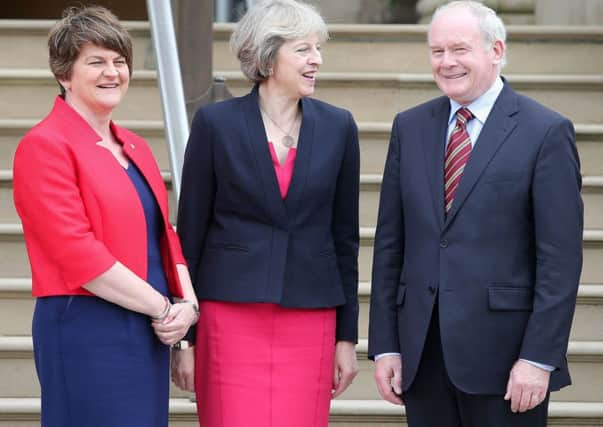PM responds to Brexit concerns but offers no new commitments


In separate replies to First Minister Arlene Foster and Deputy First Minister Martin McGuinness, Theresa May insisted the future of the Irish border post-Brexit is an important priority for the entire UK, not just Northern Ireland.
She also pledged to take full account of the region’s specific interests in the negotiations with Europe.
Advertisement
Hide AdAdvertisement
Hide AdBut while the letter reiterated the Government’s previously stated general positions on Northern Ireland aspects of Brexit, it did not include any detailed pledges around specific concerns raised by DUP leader Mrs Foster and Sinn Fein veteran Mr McGuinness.
Their letter to Downing Street was sent on August 10, and TUV leader Jim Allister made light of the two-month delay in Mrs May’s response, adding that in it she “says nothing”.
The future of the border has dominated the post-referendum fall-out across Ireland, with politicians north and south insisting the current arrangements that allow for free flow of people and goods must be maintained.
In her reply, Mrs May wrote: “I am committed to full engagement with the Northern Ireland Executive on the UK’s exit from the EU and will take full account of the specific interests of the people of Northern Ireland in order to get the best deal possible for all parts of our United Kingdom as we leave the EU.”
Advertisement
Hide AdAdvertisement
Hide AdThe prime minister continued: “I agree with you that the future of the border with Ireland is of the highest priority for Northern Ireland and indeed is an important priority for the UK as a whole.”
In Northern Ireland, 56% backed Remain in June’s historic referendum.
Of the five main parties in the Province, Sinn Fein, the SDLP, the Ulster Unionists and the Alliance Party all campaigned for Remain – while the DUP, the largest party, backed Brexit.
The original letter, which focused on the potential downside of leaving the EU, saw Mrs Foster accused of U-turning on her pro-Brexit stance – a claim the DUP leader denied.
Advertisement
Hide AdAdvertisement
Hide AdThe letter from Mrs Foster and Mr McGuinness stressed that Brexit could not be allowed to compromise cross-border efforts to tackle organised crime and those opposed to the peace process.
The ministers also said it was critical that businesses retained their competitiveness and did not incur additional costs and that access to sources of skilled and unskilled labour from the EU must be retained.
Mrs May invited Mrs Foster and Mr McGuinness to the the Joint Ministerial Committee at Downing Street on October 24.